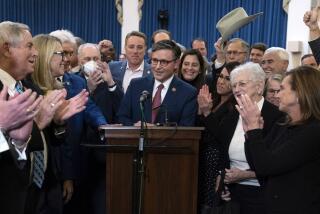Gephardt Hopes to Deny GOP Congress’ Political Center
- Share via
WASHINGTON — Savoring the sight of Republican disarray with unconcealed pleasure, House Minority Leader Richard A. Gephardt (D-Mo.) said Wednesday that he hopes to forge his own working majority in the House by wooing moderate Republicans to vote for centrist Democratic bills.
Gephardt said that the GOP’s likely choice for speaker of the House, Rep. Bob Livingston (R-La.), is “a nice, friendly person” but that he doubts Livingston can exert effective leadership over the GOP’s fractious conservative wing.
“I don’t think Newt was their problem,” Gephardt said at a lunch with reporters, referring to Speaker Newt Gingrich (R-Ga.), who announced his resignation last week. “Their problem is that the far right dominates their party.”
As a result, Gephardt suggested that he will have an easier time welding a bipartisan coalition of Democrats and moderate Republicans than Livingston will have attracting Democratic votes for GOP initiatives.
“What I see is a unified Democratic Party that can work with moderate Republicans and get a lot of things done,” he said. “I don’t see it’s going to be very easy for Bob Livingston . . . to put that kind of coalition together.”
Republicans will hold a slim majority of 11 seats in the next House. If Gephardt can hold his party together and attract only six GOP mavericks, the balance could tip.
Of course, that is easier said than done. Gephardt acknowledged that his status as minority leader will not help. “You can’t control the agenda,” he noted.
And Livingston has had little difficulty winning support from GOP moderates so far.
Indeed, the attention both leaders are paying to centrists suggests that moderates on both sides of the aisle may wield unusual influence in the new Congress because they will have the votes to swing an issue either way.
Gephardt said that he hopes to win bipartisan support for centrist legislation that would pick up where House Democrats left off before the fall election campaign: managed health care regulation “first and foremost,” followed by increased federal aid for public education and Social Security reform.
The strategy appears aimed at least partly at improving the Democrats’ chances of winning the six additional seats they need to achieve a majority in 2000. If Gephardt wins some of his key legislative battles, he can campaign in two years on that record. And if he loses, he can simply reprise this year’s Democratic campaign theme: that the right wing of the GOP blocked action on these popular issues.
On Social Security, Gephardt said that he is strongly opposed to any proposal for creating individually directed retirement accounts as part of the national pension system.
Republican leaders have been promoting several versions of such a plan, and some Clinton administration officials have said that they would not rule out some forms of the idea.
“I would be very much against individuals investing in anything they want . . . because then you’d end up with a lot of people in uranium stocks,” Gephardt said. “We’d have no safety-net pension plan.”
Instead, he said, he would consider taking part of the current federal budget surplus and turning it over to the Social Security system’s trustees to invest.
Gephardt also vowed to oppose an increase in the payroll tax that supports the Social Security system or a downward adjustment in recipients’ future benefits. “I don’t want to go through that again,” he said, recalling the fury that followed a modest readjustment of benefits in 1983.
Gephardt, who ran unsuccessfully for the Democratic presidential nomination in 1988, said that he has not yet decided whether to try again in 2000. He will decide at a time he described as “Januaryish,” adding that he does not believe Vice President Al Gore has a prohibitive hold on the nomination.
But he was distinctly more animated when he talked about the challenge of wresting control of the House from the now-weakened Republicans. And he noted that it would be difficult, if not impossible, to run for president and function effectively as minority leader.
“You have to set yourself a clear goal, a clear goal--and then throw yourself into it.”
More to Read
Get the L.A. Times Politics newsletter
Deeply reported insights into legislation, politics and policy from Sacramento, Washington and beyond. In your inbox twice per week.
You may occasionally receive promotional content from the Los Angeles Times.











